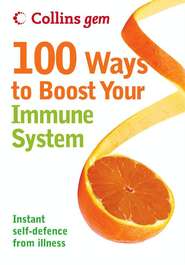По всем вопросам обращайтесь на: info@litportal.ru
(©) 2003-2024.
✖
100 Ways to Boost Your Energy
Автор
Год написания книги
2019
Настройки чтения
Размер шрифта
Высота строк
Поля
Around 4 million women in the UK suffer from anaemia caused by lack of iron, but the syndrome may also occur in men.
Iron is essential to the formation of haemoglobin, the oxygen-carrying component of red blood cells. A nutritional deficiency of iron can lead to low blood haemoglobin levels and a reduced supply of oxygen to organs, tissues and cells. Inadequate oxygen supplies immediately inhibit your body’s energy production and can result in fatigue, apathy, irritability, a racing heart rate and shortness of breath. In other words, your body needs iron to produce red blood cells and carry oxygen around your body; without it you’ll feel lethargic no matter how much sleep you get.
If you suffer from tiredness and heavy periods, ask your doctor for a blood test to determine your iron levels. To reduce the risk of anaemia, make sure you eat a balanced diet with plenty of green vegetables. Don’t take iron supplements unless advised to by your doctor, as the best way to get your iron is from your diet.
Undiagnosed diabetes
According to the Healthcare Commission, thousands of people in the UK may be unaware that they have diabetes. This is partly to do with high-sugar diets, obesity and sedentary lifestyles. Diabetes occurs when the amount of glucose (sugar) in your blood is too high and your body is unable to convert it into energy because there is not enough insulin or the insulin produced isn’t working properly. The body then breaks down its stores of fat and protein to try to release more glucose, and the problem gets worse. This is why people with untreated diabetes can often feel tired and lose weight. Other symptoms include urinating often and extreme thirst.
To rule out diabetes, ask your doctor for a blood test. If the test is negative for diabetes then your tiredness might be caused by your blood sugar levels. Cravings for starchy, sweet or fatty foods can mean you have a blood sugar imbalance. To keep your blood sugar levels steady avoid sugar and refined, processed foods as well as juices, cigarettes and caffeine. Eat every 3 hours and load up on wholegrains, vegetables, legumes, nuts, seeds and foods that are as fresh, natural and as unprocessed as possible.
Underactive thyroid
Your thyroid works by producing the hormones which control metabolism and regulate energy levels. If your thyroid produces too little of these hormones, you feel tired. You might gain weight, your skin and hair will feel dry, and you may also feel depressed.
To rule out problems with your thyroid, ask your doctor for a thyroid test. If you have an underactive thyroid, he or she will prescribe medication to boost your hormone levels. You should also exercise regularly and eat a diet high in fruit, vegetables, fish and seaweed, while avoiding alcohol and cigarettes.
Food intolerances
One in 10 people in the UK has a food intolerance that can cause lethargy and irritability. Food intolerances trigger an immune response which uses up a huge amount of energy, and the most common food culprits are wheat, dairy products and sugar. So if your lunch was a cheese sandwich on wholewheat bread with a bar of chocolate, your body may be using up energy simply digesting your meal rather than converting it into energy.
If you suspect that you have a food intolerance, keep a food diary for a few weeks and see if there is a connection between your tiredness and a specific food. Common offenders are dairy products, soy, corn and gluten (found in wheat and other grains). Try eliminating the food that you suspect is making you feel tired and see if this makes a difference. Alternatively, you can ask your doctor to give you a blood test to check for food allergies.
Other common causes of fatigue
Sinusitis: An infection of the sinuses that is caused by irritation due to allergies, or by bacterial infection. Symptoms include stuffy nose, headache and fatigue, which are so similar to cold symptoms it can be hard to know what is going on. This perhaps explains why sinusitis is one of the most common causes of fatigue – millions of people suffer in silence.
PCOS (polycystic ovary syndrome): If you’re a woman and, despite eating healthily, you find that the weight is piling on, you may be suffering from PCOS, which can affect as many as 1 in 5 women. Fatigue and weight gain are symptoms of this under-diagnosed condition, in which the ovaries and sometimes the adrenal glands, for unknown reasons, pump out too much male hormone. Thinning hair, insulin resistance, excess facial hair, severe acne, irregular periods and impaired fertility are other symptoms. To rule out PCOS, make an appointment with your doctor and discuss the possibility of PCOS as a cause for your fatigue. If you are diagnosed with the condition, the good news is that, as with diabetes – and hypertension or high blood pressure – PCOS can be successfully managed with a low glycaemic diet and lifestyle changes. Patients may also be considered for treatment with a diabetes medicine called Metformin, especially if they’re overweight. It seems to reduce excess male hormones and balance blood sugar levels.
Hypertension: Recent research has linked sleep disorders and chronic tiredness to high blood pressure. Like diabetes, high blood pressure or hypertension is a silent disease, and you may not be aware that you have it. This is another reason why regular check-ups with your doctor or GP are advised.
Sleep apnoea: Sleep disorders such as sleep apnoea can seriously disrupt sleep and cause chronic fatigue during the day. A person with sleep apnoea has breathing problems when they are sleeping, and this can cause loud snoring and frequent night waking.
Chronic fatigue syndrome (CFS): CFS is a recognised medical condition that causes exhaustion and fatigue without any clear causal factors. There is no hard-and-fast test for this syndrome, but it is diagnosed ‘by exclusion’. This means that if doctors have tested for everything else without success, this is the only possibility left. Chronic fatigue is nonetheless a real condition. Although it is not directly treatable, it can be managed well enough to allow people to return to good health in time.
Depression: One of the most common symptoms of depression is fatigue. If your energy is low from a busy lifestyle, you’re generally going to recognise the value of what you are doing with your life, even if it is exhausting. The hallmarks of depression are feelings of helplessness, hopelessness and the inability to do anything about it. So if you start to feel that there is nothing you can do but give up and this feeling doesn’t go away after two weeks, it’s usually time to see your doctor or a therapist.
Medication: Many over-the-counter medications and prescription medicines have fatigue as a side effect. Antihistamines, beta-blockers, antidepressants and cholesterol medications, among others, could be causing tiredness, so if you are on any medication and are constantly feeling tired, be sure to make an appointment with your doctor to discuss the side effects of your medication and to suggest possible alternatives.
Weight gain: You probably don’t need reminding that carrying excess weight increases your risk of heart disease, diabetes, aches and pains, and poor health in general. You may need reminding, however, that weight gain is a major cause of chronic tiredness. Carrying all that excess weight around is exhausting. If you need to lose weight, the first and most important rule is to never go on a diet. Crash diets, however tempting they may sound, are not the answer. Although you may lose weight initially, the chances are you’ll end up putting it all back on again. Quick-fix and faddy diets don’t teach you how to change your eating habits on a long-term basis, which is what you really need to do if you’re going to keep the weight off. So forget about dieting, fad or otherwise, and think about a whole new way of eating.
Successful dieters are not people who are on a diet at all, but those who learn how to eat plenty of healthy, fresh food rich in nutrients that can boost their metabolism and energy, and who get plenty of energy-boosting exercise every day.
Clock change: Twice every year the clocks go either forward or back one hour. This can create problems falling asleep as it tinkers with your body clock. You may experience fatigue and loss of energy and symptoms similar to mild jet lag. To make the transition a little less tiring, begin to re-jig your sleeping routine a few days before the time change by hitting the sack earlier (for the Spring clock change) or later (for the Autumn change). You could start by going to bed 15 minutes earlier or later, and then the next night 30 minutes and so on. You could also reorganise your mealtime schedule by eating dinner earlier or later. Once the clocks have changed, get at least 15 minutes’ exposure to sunlight, without glasses on, first thing in the morning. The bright sunlight (or any bright light) tells your body’s natural biological clock that it’s time to wake up; that same clock will then be set to tell your body it’s time to go to sleep about 14 to 16 hours later. Finally, maintain an easier schedule on the Monday after the time change, and try to minimise driving on that day.
If in doubt about the cause of constant fatigue see your doctor. In the great majority of cases tiredness is not caused by an underlying illness, but if you don’t know why you’re always tired, it may be increasing your risk of becoming ill. More and more scientific studies are showing correlations between tiredness with a variety of serious diseases, including hypertension, diabetes, lupus and depression. So if your tiredness has gone on for more than two or three weeks, be sure to make an appointment with your doctor for a health check.
The energy solution (#ulink_d549d13e-2fca-5463-b5aa-af047b3b42bc)
The causes of low energy can be many and varied, and getting a good night’s sleep may not always provide the answer. In fact, getting too much sleep can be just as harmful as getting too little. However, if medical reasons for your tiredness have been ruled out and your energy is still persistently low, it is time to make simple but important changes to your diet and lifestyle.
Nothing has a more profound effect on your life than your energy. Remember, your energy levels are not determined at birth. They depend on what you eat and drink, and how you choose to think and live. You have more control of your zest levels than you think.
The 100 energy boosters that follow will help give you the right fuel and all the advice you need to reinvigorate yourself both in the short and long term. They will help you meet the demands and challenges of your daily life with energy and enthusiasm, and in the process improve your health, reduce stress, smooth out wrinkles and help you become a more energetic, relaxed and alive person.
PART TWO: 100 ENERGY BOOSTERS (#ulink_31f7d906-8d1c-5588-9ef5-cf003929b051)
You don’t have to work through the 100 energy boosters in any particular order; just dive into the sections that feel right to you. Whichever way you choose to incorporate them into your life, rest assured that each and every energy booster will bring out the latent but abundant energy resources within you.
Hopefully you will find enough suggestions and ideas in here to put the spring back into your step and the zest back into your life.
Boost energy with a good night’s sleep (#ulink_5400e1c3-61aa-5502-987e-7c39fbc944f4)
1 Beat the clock
Steady energy levels are among the acknowledged benefits of a good night’s sleep. If you need an alarm clock to wake up in the morning, you aren’t getting enough re-energising sleep. If, however, you can anticipate your alarm clock by waking up 5 to 30 minutes before it goes off feeling naturally refreshed, chances are you are getting a good night’s sleep.
If you find it impossible to get out of bed without an alarm, don’t change the time you rise. Instead, go to bed half an hour earlier than usual for the next week to give your biological clock a chance to reset. If you still need an alarm clock after a week, add 15 to 30 more minutes to your sleep time for another week. Keep going until you can wake without the alarm and feel alert and energetic all day.
2 Bounce out of bed (at 7.22 a.m.)
Many of us try to make up for lost sleep by staying in bed longer on days off and weekends, but these lie-ins might be doing you more harm than good. Your brain does not have a different biological clock for weekdays and weekends. If you have a long lie-in on Sunday you are likely to stay up until the small hours of Monday morning. A few hours later the alarm clock will disturb your peaceful slumber and you’ll start your day feeling sleepy and fuzzy-headed.
Sleep experts believe that 6 to 8 hours’ sleep is optimum for most people. And if you want to enjoy maximum health and vitality, your sleep must be regular. This means getting up and going to bed at the same time each day, including weekends.
So on days off, don’t stay in bed. It’s far healthier to get up when you wake up naturally. Research shows that those who get up early feel more alert than those who rise later. In fact, 7.22 a.m. was the precise time experts pinpointed, so – if you can – avoid burning the midnight oil and let the morning sun shine in.
3 Make the most of doziness
In the few moments before you are fully awake, you’re in what is called a ‘hypnopompic state’ – about the closest you can get to being hypnotised without nodding off. Your body is awake but your brain is highly suggestive to whatever thoughts you want to plant there. So turn on your back (you’re less likely to fall asleep again in this position) and focus on three things you are looking forward to that day. Even if it is just your first cup of tea, focusing on small positives helps you start the day optimistic and full of energy.
It doesn’t matter if you don’t feel like bounding out of bed. Just think about what you have to look forward to that day or what you want to achieve, and then just get up. The thoughts you think on waking can set the tone for the whole day. Tell yourself it’s going to be a wonderful day and good things are going to happen. It can seem an effort at first, but after a few attempts you will feel more in control of your life and more energised.
4 Bed MOT
A good night’s sleep often depends on how comfortable your bed is. Studies show that, on average, people with uncomfortable beds sleep 1 to 2 hours less at night than those with comfortable beds.
If your bed is fewer than 8 years old, a mattress-topper – a comfortable, supportive layer that sits on top of your mattress – can be the perfect solution. If your bed is older than 8, it will definitely need replacing.
When buying a new mattress, check that it supports your body at all points. If you aren’t getting enough support you’ll get back pain, but a mattress that’s too hard can create uncomfortable pressure. There is nothing wrong with a soft mattress as long as it gives you enough support, especially in the small of your back and under your knees. The ideal mattress should keep your spine in alignment and distribute pressure evenly across your body. A mattress has to be soft enough to fill in the gap under your lower back, but not so soft that it sags completely under your weight.
Вы ознакомились с фрагментом книги.
Приобретайте полный текст книги у нашего партнера:
Приобретайте полный текст книги у нашего партнера:







![The Dream Dictionary from A to Z [Revised edition]: The Ultimate A–Z to Interpret the Secrets of Your Dreams](/covers_185/48653382.jpg)



